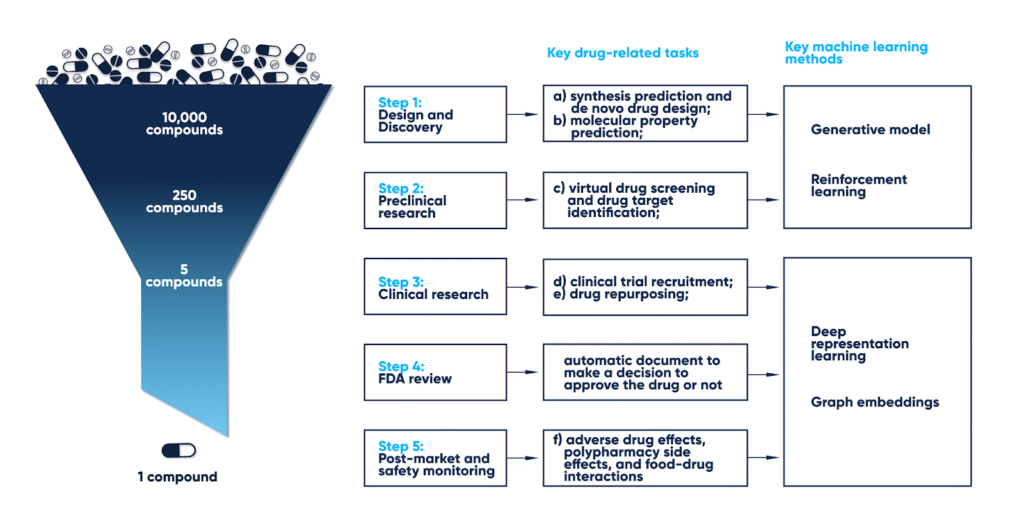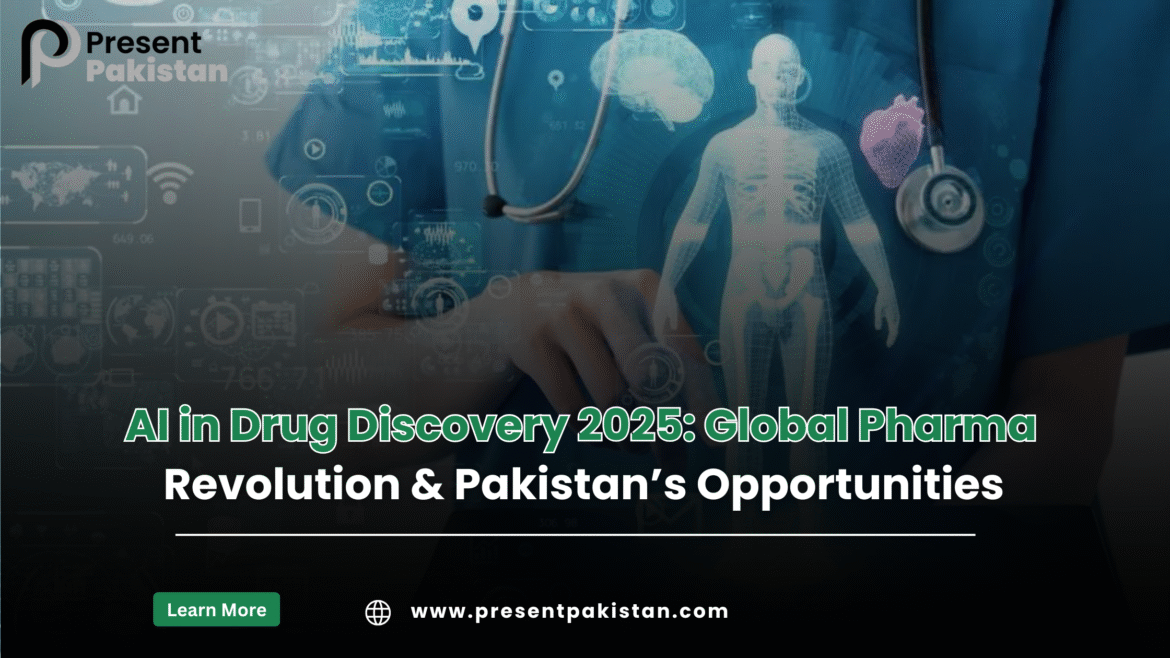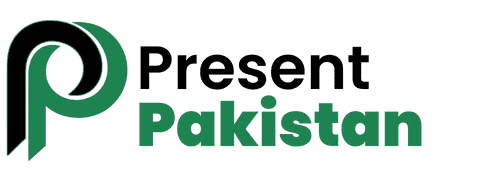AI in Drug Discovery 2025 is changing the world of pharma by making it faster, cheaper, and better. Will Pakistan catch the curve or fall behind?
AI in Drug Discovery 2025: A Global Revolution
AI in Drug Discovery 2025 is not just a scientific breakthrough; it is fundamentally changing the way the industry discovers, designs, and delivers new medicines. Advanced machine learning (ML), natural language processing (NLP), and generative AI have allowed scientists across the globe to reduce the scope of drug discovery from years to months. This transformation in drug discovery provides enormous value for Pakistan and will signal more vital opportunities but also critical challenges if these opportunities cannot be achieved.
Table of Contents
- The Rise of AI in Drug Discovery
- Why 2025 Is a Turning Point for Pharma
- AI Techniques Driving Pharmaceutical Research
- Key Global Success Stories in AI Drug Discovery
- Challenges Facing AI Adoption in Pharma
- AI in Drug Discovery and Pakistan’s Opportunities
- AI in Drug Discovery 2025
- Ethical, Legal & Regulatory Concerns
- The Future of AI in Global & Local Healthcare
- Present Pakistan & the Need for Awareness
- FAQs
- People Also Ask
- Conclusion
- Stay Ahead With Present Pakistan
The Rise of AI in Drug Discovery
The Emergence of Artificial Intelligence in Drug Discovery. Artificial intelligence is reshaping the field of drug discovery. Historically, bringing a drug to market has typically taken 10-15 years and upwards of 2.5 billion U.S. dollars; however, RxDrug discovery by way of AI can predict protein structures, design drug-like molecules, and simulate drug-disease interactions in seconds rather than years.
- Companies such as Insilico Medicine and Exscientia have developed AI-discovered drugs and are now moving them into clinical trials.
- Big Pharma has companies like Pfizer, Novartis, and AstraZeneca putting billions into AI and AI-powered drug discovery pipelines.

Key Points:
- AI cuts drug discovery timelines dramatically.
- Pharma companies are shifting from manual trial-and-error to predictive science.
Why 2025 Is a Turning Point for Pharma
The year 2025 will represent a momentous pivot. We are witnessing some AI-discovered drugs entering mid-stage clinical trials, taking AI from not just a tool but an engine of pharmaceutical discovery.
For instance:
- AI has identified antibiotic compounds with effectiveness against superbugs.
- AI-driven models are predicting rare disease therapies when the former pharma has failed.
Key Points:
- 2025 is when AI-discovered drugs will prove themselves in clinical trials.
- Pharma is now synonymous with “AI-first.”
AI Techniques Driving Pharmaceutical Research
Machine Learning Models
Machine learning allows researchers to evaluate millions of different compounds and forecast which will be successful, and it safely reduces the amount spent in the lab.
Deep Learning and Neural Networks
With dedicated GPU hardware, deep learning can model complicated combinations of molecules that previously would have taken years in a lab.
Generative AI as a Molecule Development Tool
Generative models can be used to create new molecules from scratch and are able to be constructed with specificity for an individual disease.
Natural Language Processing for Drug Discovery
NLP can mine through large quantities of biomedical articles, patents, and research articles to find new candidates for drug development.
Key Points:
- AI models can make drug candidate discovery happen faster.
- Generative AI can create molecules that human chemists will never think of.
Key Global Success Stories in AI Drug Discovery
- DSP-0038: A drug discovered through AI went from idea to phase 1 trials in record time
- Rentosertib: A novel drug for lung fibrosis fully developed by AI that is now under clinical evaluation
- MIT’s AI antibiotics: Developed antibiotic compounds against resistant bacteria.

Key Points:
- AI is already producing real drugs, not just theoretical drugs
- Clinical validation is happening with AI to support success in pharma.
Challenges Facing AI Adoption in Pharma
Despite the excitement around AI in pharmaceutical drug discovery, we are facing challenges that stand in the way of widespread adoption:
- Data shortage or scarcity around rare diseases.
- Bias in data to help the algorithm refine its prediction.
- High cost to integrate the AI lab into the pharma pipeline.
- Regulatory uncertainty on AI-discovered medicine.
Key Points:
- AI is incredibly powerful, but without high-quality data, it is at risk of failure.
- Regulatory frameworks will dictate the speed of the transition from lab to patient.
AI in Drug Discovery and Pakistan’s Opportunities
This revolution provides opportunities for Pakistan:
- Affordable drug development: If AI helps local pharma to reduce their R&D costs, it means drug development will be more affordable.
- Healthcare Innovation: AI-developed drugs MAY provide solutions to help with Pakistan’s disease burden.
- Talent Development: AI researchers located in Pakistan may become partners with international pharma.
- Export Opportunity: If Pakistan can build the appropriate basics, it will provide the chance to become a hub for AI-developed generics.
Risks of this revolution include:
- Pakistan will continue to be a laggard if they don’t implement AI into health care and increase its dependency.
- The lack of new infrastructure and investment may impact the ability of the market to grow.

Key Points:
- Pakistan can leverage AI for cost-effective pharma solutions.
- Delay in adoption may widen the gap with global pharma leaders.
AI in Drug Discovery 2025
AI in Drug Discovery 2025 is not simply a fad. Pharmaceutical companies worldwide are putting AI to work and speeding up timelines, saving costs, and making better medicines. For Pakistan, AI in drug discovery in 2025 means moving forward in the global ocean of healthcare development rather than drowning.
Key Points:
- AI in Drug Discovery 2025 is a reflection of a transformed global fulfillment of pharmaceuticals
- Pakistan has risks and opportunities relating to this evolution.
Ethical, Legal & Regulatory Concerns
Who owns the patent on a drug discovered by AI? The company? The algorithm?
Transparency: Can patients trust that drugs will be valid that are developed using ‘black box’ models?
Ethics: Will the ethical concerns of AI shift as there is a reduced need for research?
Key Points:
- There are a lot of ethical issues in pharma.
- Some regulations need to be updated to recognize AI-based science.
The Future of AI in Global & Local Healthcare
By 2030, AI is projected to manage 70% of early drug discovery, feeding the results to scientists so they can refocus on clinical outcomes instead. Therefore, Pakistan’s pharma sector must prepare for this radical change with policies, investments in AI education, and collaborations internationally.

Key Points:
- AI will be the backbone of global pharma in the future.
- Pakistan needs to choose to invest today to reap the benefits of this investment tomorrow.
FAQs
Q1: What is AI in Drug Discovery 2025?
AI in Drug Discovery 2025 is the terminology used to describe a method of applying artificial intelligence to speed up pharmaceutical research, cut costs, and more quickly develop novel drugs.
Q2: How does AI support pharmaceutical research?
AI is used to analyze complex datasets, predict drug-target interactions, and design new molecules from concept through testing. In this way, AI can eliminate years from the traditional process of drug discovery.
Q3: What opportunities does AI drug discovery create for Pakistan?
Pakistan could reduce the costs of drug development, be innovative in its healthcare delivery, and partner with global organizations through investments in AI-based R&D initiatives.
Q4: What barriers exist to AI-based drug discovery?
Significant barriers include data integrity, uncertainty about regulation in life sciences, infrastructure investment, and ethical concerns.
Q5: Is AI replacing human researchers?
No, AI is augmenting researchers by tackling the data-heavy parts of research, while people retain the focus on gaining insights, developing ethical guidelines, and oversight of the clinical trial process.
People Also Ask
1. When will AI be able to discover a new drug in 2025?
AI is the only way to reduce a 10-15 year discovery process to a 2-4 year process by simulating interactions and success rates with a high level of accuracy.
2. Can AI cure previously untreatable diseases?
AI will provide new hope for rare and resistant diseases through the identification of new compounds missed by traditional methods.
3. What makes 2025 a significant year for AI in pharma?
We have obviously seen some AI-discovered drugs in clinical trials. This demonstrated their utility to help us in real-world healthcare.
4. How can Pakistan participate in AI-driven pharma globally?
Pakistan could potentially be a very competent and cost-effective R&D hub, but it will need to invest in AI training, pharma sector structure, and international connections.
Conclusion
AI in Drug Discovery 2025 will change the rules of the game in pharmaceutical research. It’s changing the process by which drugs are produced, increasing the speed of the timeline, and decreasing the cost. Pharma giants across the globe are in a race against time to incorporate AI into their pipelines, while Pakistan is facing both an opportunity and a challenge. If it invests in AI research, training, and infrastructure, Pakistan can be part of the global revolution or miss the train.
Stay Ahead With Present Pakistan
Stay ahead with Present Pakistan, your trusted platform for global health, pharma, and technology insights. To explore more in-depth articles and updates, visit Present Pakistan.







